
NATIONAL & INTERNATIONAL SEMINAR
12. National Meet on Total Voluntary Blood Programme Vision 2020
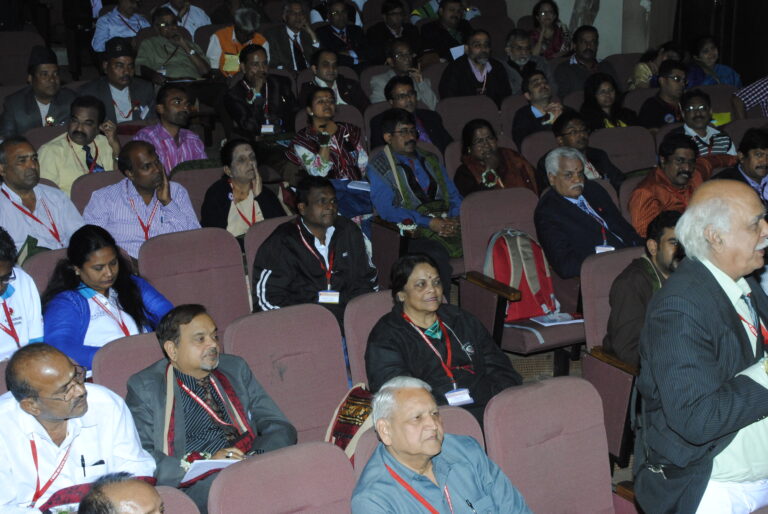
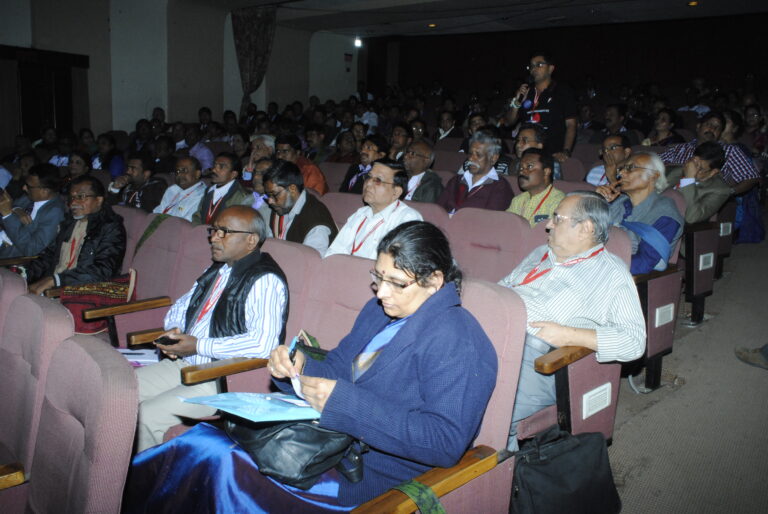
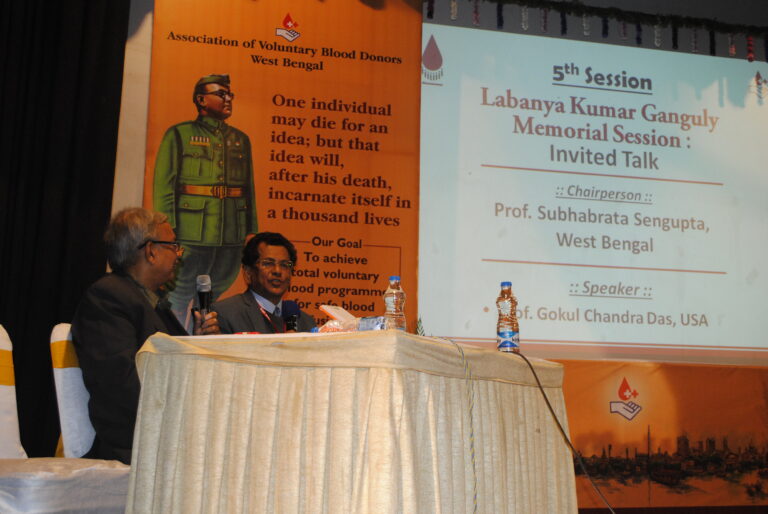
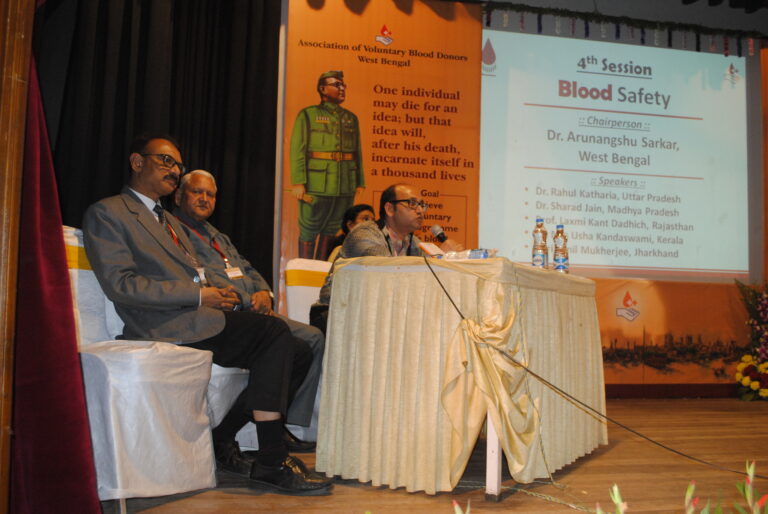
Date January 23, 24 & 25, 2015
Venue Rotary Sadhan, Kolkata
Participants 250 participants from home and abroad
Association of Voluntary Blood Donors West Bengal
1. Inaugural Session
2. Scenario of Voluntary Blood Donation – Home and Abroad;
3. Basics;
4. Exploring Methods for Achieving Total Voluntary Blood Programme by
2020;
5. Blood Safety;
6. 6.Dr. Labanya Kumar Ganguli Memorial Session: Blood Borne Pathogens:
An Overview on Hepatitis C Virus (Invited Talk);
7. From the Lamp of History (Invited Talk): X – Ray Crystallography A
Journey Through Hundred Years;
8. Donor Recruitment – Home & Abroad-I
9. Bhaskar Bhattacharyya Memorial Session: Donor Recruitment Strategy to
Achieve Total Voluntary Blood Programme by 2020;
10. Searching Literature (Invited Talk);
11. Gouri Bhadra Memorial Session Long Term Strategies for Donor
Recruitment;
12. Communication & Public Relations;
13. Modern Technology in Blood Banking,
14. Donor Recruitment Programme Home & Abroad-II;
15. Dr Sujit Chaudhuri Memorial Session: Disaster Management (Invited Talk);
16. Reducing Blood Need;
17. Panel Discussion (IEC Materials);
18. Blood Donation Camp;
19. Donor Service;
20. Donor Recruitment and Retention;
21. Voluntary Organisation;
22. Valedictory Session.
1. All Stakeholders involved in Voluntary Blood Donation and Blood
Transfusion should strive to achieve the goal of reaching 100% Voluntary
Non-remunerated Donation of Blood and Blood Components by the year
2020 as set by WHO with the necessary logistic support of concerned
authorities.
2. Voluntary Organisations should identify multiple Organised Target Groups with emphasis on Youth in the surroundings of each Blood Bank to ensure keeping the Blood Bank shelves full at all times and build up a strong base of repeat voluntary donors so as to maintain 100% Blood availability in all Blood Banks.
3. The effective School Education Programme in vogue in West Bengal since 1980 as presented in this Meet be introduced in all states for imparting value education in young minds as a long term strategy to recruit blood donors of tomorrow.
4. Department of AIDS Control, Govt. of India and the concerned authorities should regularly update their websites with necessary and relevant user-friendly information about National Blood needs, Blood Collection, State-wise break-up, Voluntary Blood Donation, Blood Bank details etc.
5. DAC must ensure stringent implementation of all Policies, Procedures, Legal Aspects and Guidelines in vogue across all the States and Union Territories uniformly from Donor Selection to post transfusion follow-up.
6. Voluntary Organisations with adequate experience of working persistently and consistently in the field of promoting Voluntary Blood Donation should be included in the SBTC, NBTC, Resource Groups and other Committees of National and State level to reach the National target of achieving 100% VBD.
7. Blood Safety should be given highly priority through a comprehensive
Quality Assurance programme with active involvement of Blood Users,
Blood Banks and Donor Organisations for promoting Rational Use of Blood as well as focus on Donor Education Care and Counselling.
8. Voluntary organisations and NGOs involved in promoting VBD should take up structured programmes throughout the year for increasing awareness for eradication of Thalassaemia and other preventable Hereditary Disorders that requires Lifelong Transfusion of Blood and Blood Products.
9. More number of Small, Medium and Large Voluntary Organisations to be formed at all levels in the country and the existing organisations must be strengthened by supporting and interacting with each other at regular
intervals by using modern technology.
10. Comprehensive National Blood Transfusion Service Act with rules be
formulated to replace the present sketchy provisions of Annexures of Rules of Drug and Cosmetics Act of 1940 as amended till date in the matter of Blood Banking Service.
11. The Internationally accepted practice of transfer of blood in bulk from
Government Blood Banks to Government Blood Banks on the basis of
shortage vs excess by maintaining cold chain be encouraged for better
National Service.
11. National Conference and Workshop on Voluntary Blood Donation Movement
Date: January 10, 11 & 12, 2014
Venue: Uttar Banga Marwari Bhawan, Sevok Road, Siliguri – 734001
Siliguri Suryanagar Samaj-Kalyan Sanstha
To exchange ideas among the participating organizations and project methods to implement the findings. Pinpoint the prevailing shortcomings and ways to overcome them within practical framework. Provide a comprehensive scenario of the voluntary blood donation in India and suggest probable modification for better utilization of existing infrastructure. Special focus will be given to North Eastern states of India
since large part of it is lagging behind the national average in the promotion and collection of voluntary blood donation. A consolidated report of the conference will be presented to Government bodies for their perusal and taking appropriate decision for implementation.
1. Inaugural session
2. Philosophy of voluntarism
3. Scenario of blood transfusion service
4. Organisation for building up blood donation movement
5. Prevailing and new dimensions of blood donor motivation
6. Prism session (reflection of thoughts)
7. Long term donor recruitment strategies
8. Hereditary blood disorders and their preventions
9. Role of media in promoting voluntary blood donation movement
10. Communication & public relations in blood donor motivation
11. Corporate social responsibilities towards voluntary organisation’s
12. Blood transfusion transmitted diseases
13. Legal issues in blood transfusion service.
14. Safe blood transfusion
15. Valedictory session
1. To approach NACO for updating all statistical data/information on Blood Donation and Blood Transfusion related matters and these must be updated and made available in the NACO web site periodically.
2. To approach Ministry of Company affairs, Government of India to prescribe and include promotion and support to Voluntary Blood Donation Movement in the list of CSR activities of our country.
3. To approach Ministry of Education, Government of India to include moral value inculcation classes in school curriculum (this was existing earlier but now not being followed now) with subjects including Voluntary Blood Donation.
4. To approach Drug Control Authority to prohibit unauthorized blood
collection and do away with profiteering through selling of Blood and Blood products by various Blood Banks in the country.
5. To approach Government to expand blood banking services through satellite or storage centers to make those effective and functional.



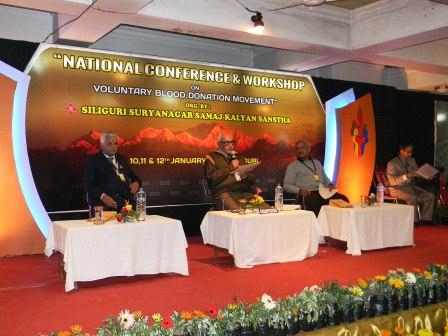
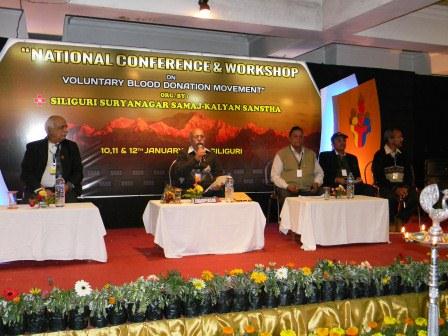
10. National Conference & Workshop on Strategies for Blood Donor Recruitment and Total Voluntary Blood Prorramme.

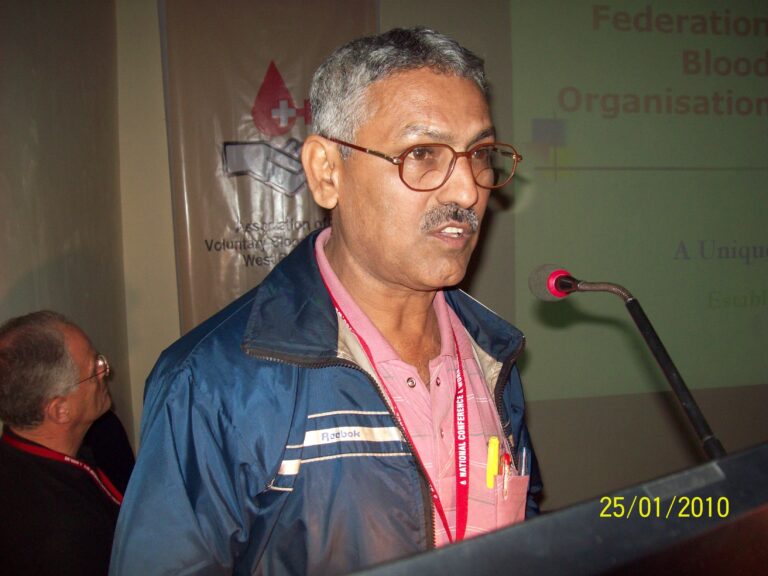
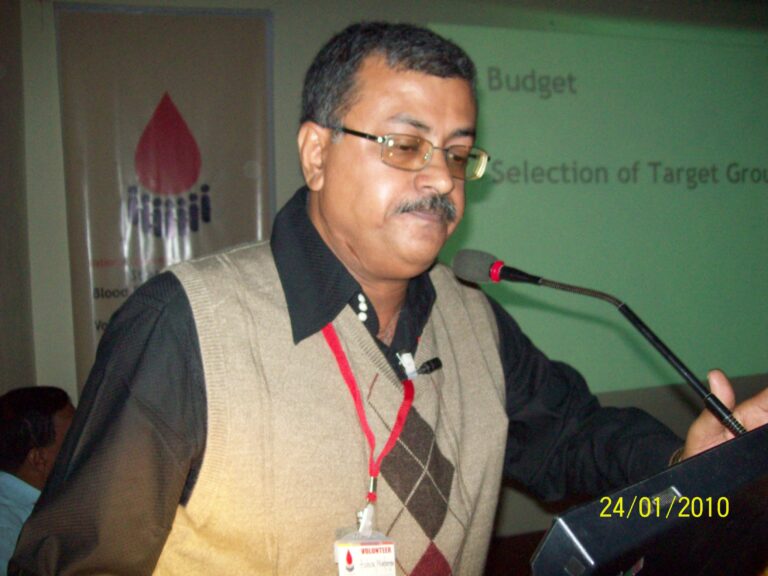



Date January 23, 24 & 25, 2010
Venue Indumati Sabha Griha, The National Council of Education Bengal, Kolkata 700032
Participants 203 participants from home and abroad
Association of Voluntary Blood Donors West Bengal
1. Inaugural Session.
2. Overview of Scenario of Blood Donation.
3. Science of Blood through Philately.
4. Motivation and Recruitment I.
5. Motivation and Recruitment II.
6. Long Term Strategies.
7. Blood Bank.
8. Country Presentation.
9. IFBD0.
10. Communication.
11. Public Relations.
12. IEC Materials.
13. Blood Science and Challenges in Recruitment.
14. Training of Motivators.
15. Donor and Safety.
16. Donor Retention and Recognition.
17. Organisation.
18. Modern Technology and Applications.
19. Blood Donations.
20. Valedictory Session
1. Recommended to the Government of India to release postal stamps on
Voluntary Blood Donation periodically.
2. To approach all 1.2 million NGOs of the country with specific reference to
0.4 million NGOs working for community, social service and health to take
active part in promoting voluntary blood donation.
3. That NACO should withdraw the recent definition of voluntary blood
donation of considering various relative and replacement donors as
voluntary donors. Voluntary blood donors must always be altruistic non-remunerated.
4. That average blood collection of each and every blood bank in India should be at least 10 units per day, of course by fulfilling the requirement of any particular blood bank, to fulfill the total blood need of the country.
5. That Blood Banks collecting less than 600 units per annum needs to be
closed.
6. That Blood Transfusion Services in India should ensure that blood and
Blood products are available, accessible and affordable to all the people of
India at all times and at all places.
7. That IEC materials containing same message in Regional Languages should be prepared through the respective State AIDS Control Societies and make
9. National Conference And Workshop of Voluntary Blood Donors Organisations
Date: January 23, 24 & 25, 2007
Venue: Regal Guest House,Mechada,Tamluk,Purba Medinipur
Participants: 110 participants from home and abroad
Tamluk Voluntary Blood Donors association
i) Inaugural Session
ii) Development of voluntary Blood Donation Systems in Various
countries.
iii) National Blood Policy of India how effective it is.
iv) Technology of Blood Donor Motivation and Recruitment.
v) Involving the Community and the need for public Relations.
vi) Role of Women in voluntary blood donation movement.
vii) Application of Information Technology to Blood Donor Recruitment
and Retention process,
viii) Communication Techniques.
Standard Operating Procedure – how being followed.
1. An all-out attempt be made to form a state-level Federation of
Voluntary Blood Donor organisations in all states and union
territories of India which will work to encourage the growth and
development of Voluntary Blood Donors Organisations at the
three-tier Panchayats in sub-divisions and districts to carry on
continuously and systematically within the legal set-up, the
activities of motivating people to donate blood voluntarily.
2. All state governments should be approached with a request to
establish a Central Blood Bank in every district of India which will
store and preserve blood collected by different Blood Banks
beyond their storing capacity.
3. The State Governments should issue Registration Certificates to
all clubs and Social Organisations by taking compulsory
undertaking that each of them would organise at least one
voluntary blood donation camp every year.
4. All state governments be apprised of the need of establishing a
Blood Bank in every sub-division of the districts.
5. In all Blood Banks, the system of separating blood components be
introduced.
6. A sustainable electronic link be built up among the Blood Banks
including all state level/District level Central Blood Banks to show
the instant storage of blood, specially blood of rare groups and the
easy process of supplying blood in time of need within the
periphery of the central Blood Banks.
7. All social organisations specially those connected with blood
donation should work hard with intense sincerity to ensure 100%
blood donation from only voluntary donors.
8. In certificate courses, the themes of Thalassemia Haemophilias
and AIDS be incorporated.
9. Seminars on voluntary blood donation be often organised with the
women of Self Help Groups (SHG) at the Block levels.

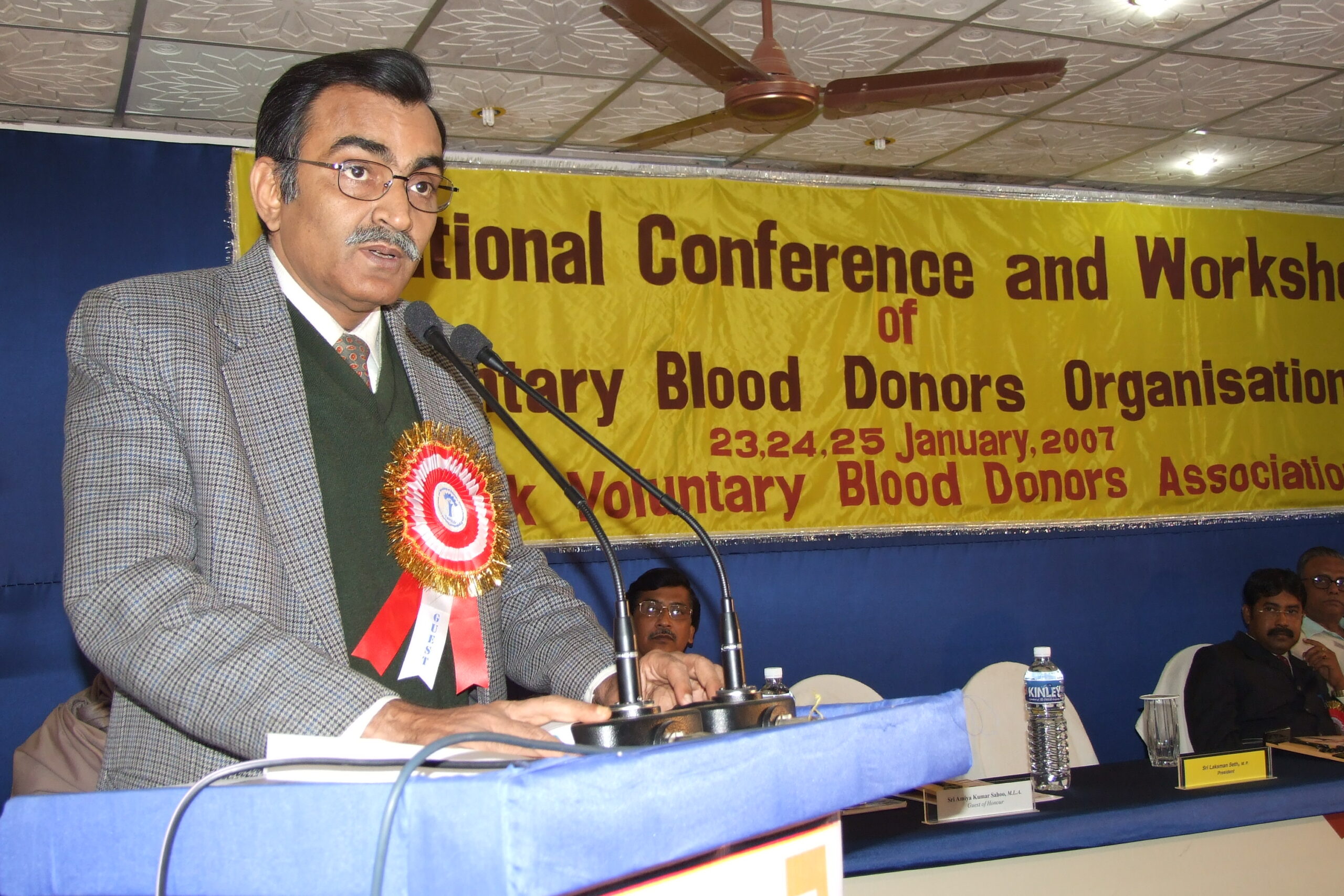
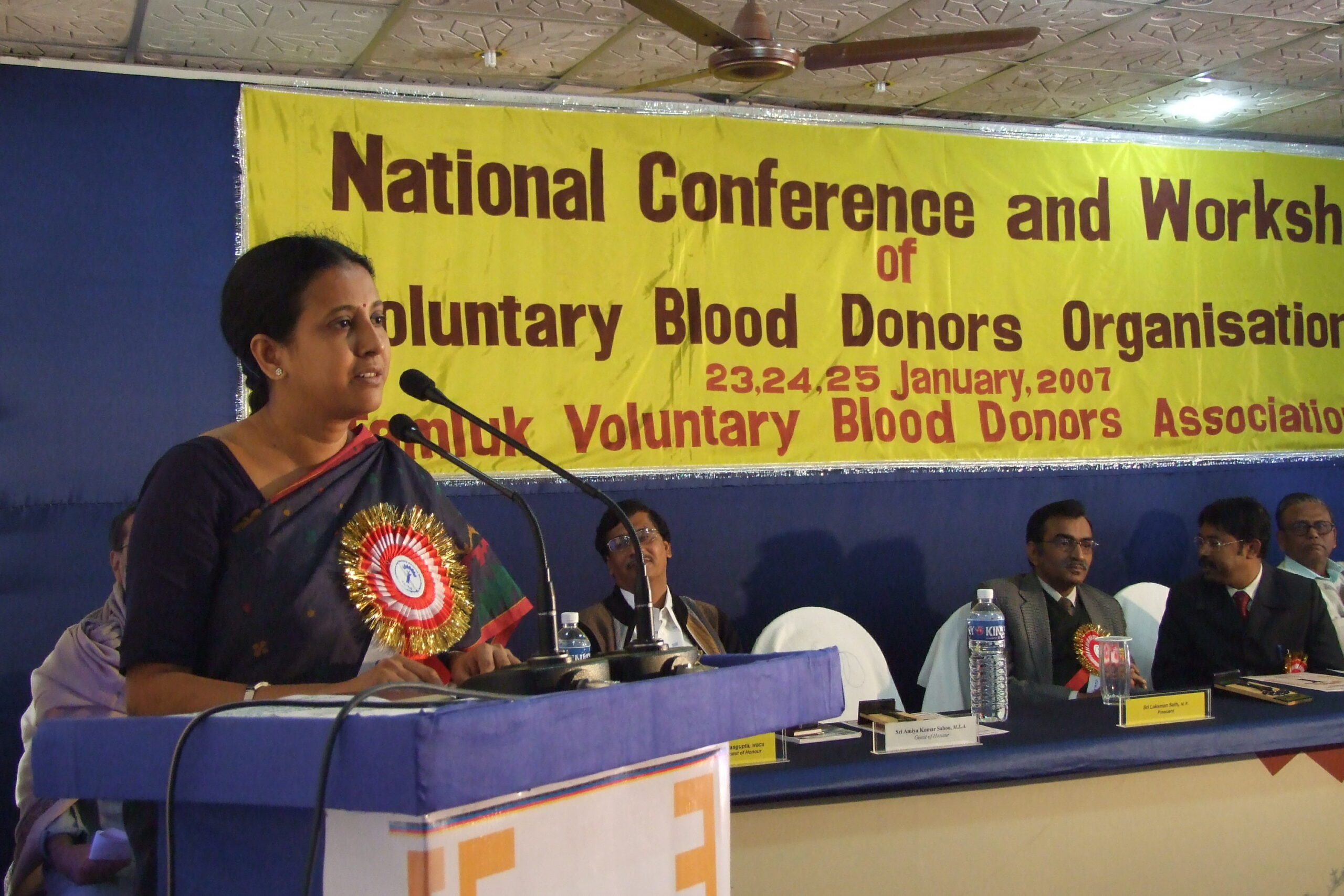

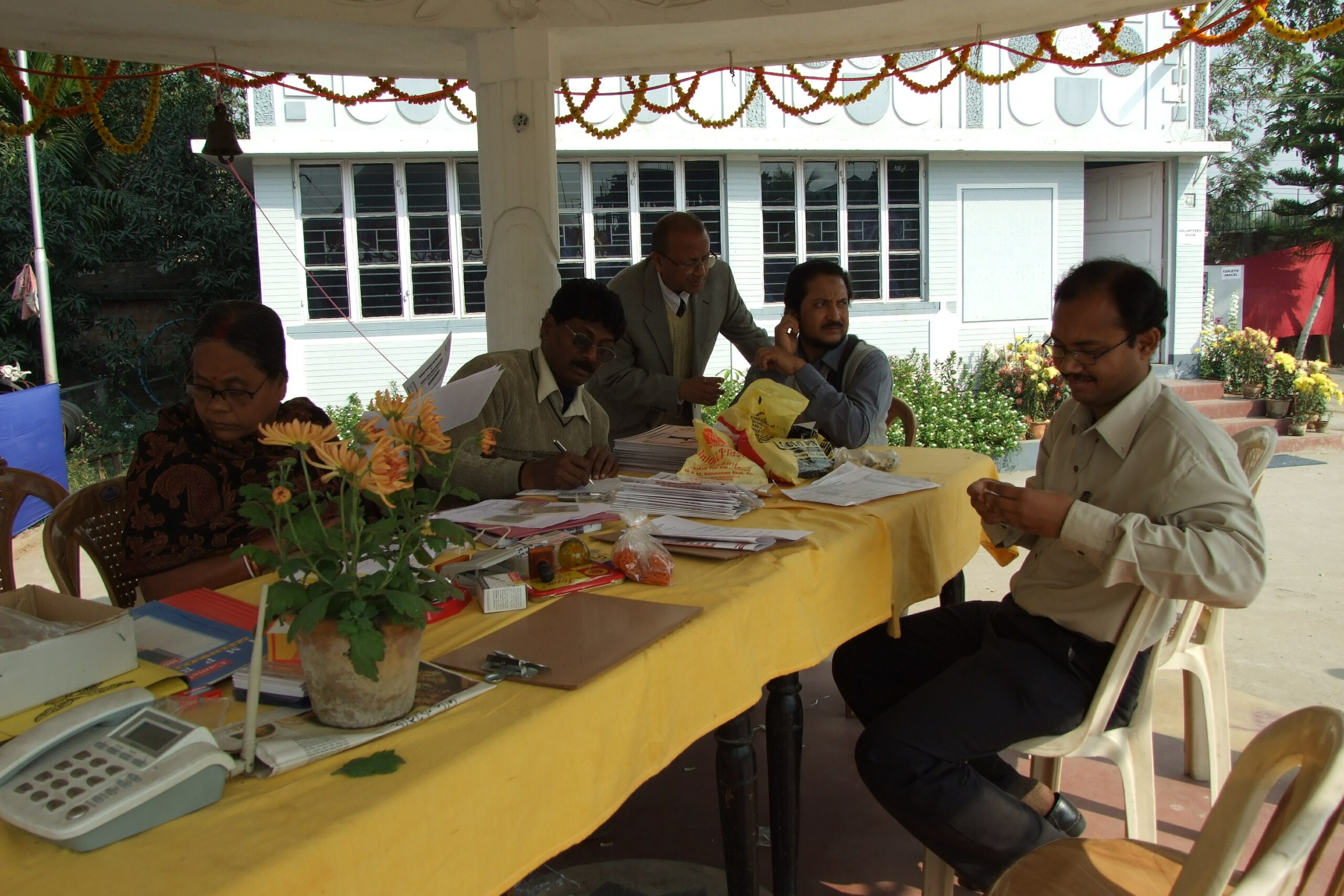

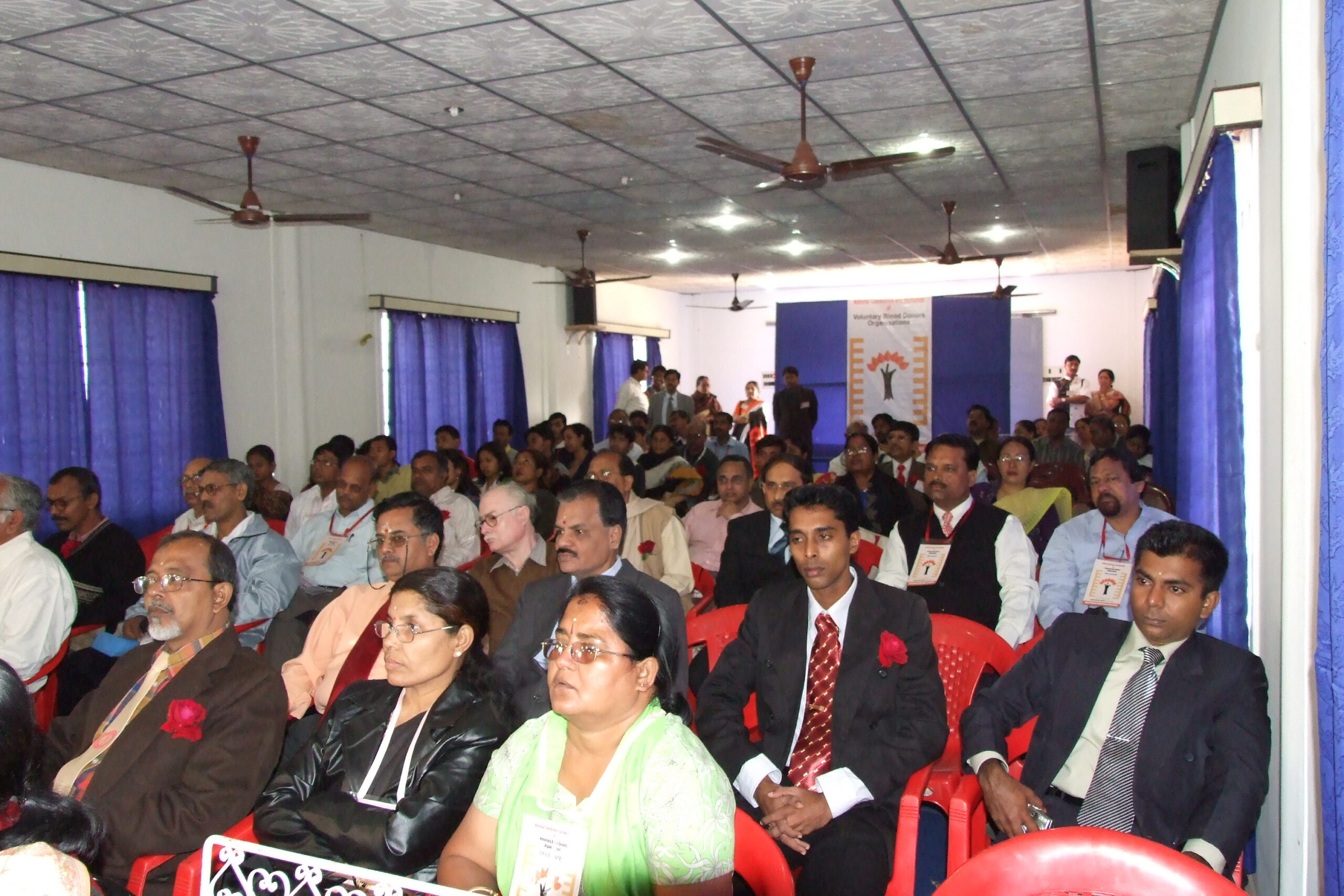
8. National Workshop on Blood Donor Recruitment and The Parliament of Motivators
Date January 23, 24 & 25, 2005
Venue Bidyut Bhavan, Salt Lake City, Kolkata 700091
Participants 227 participants from home and abroad
Association of Voluntary Blood Donors West Bengal
1. To share the strategies of successful voluntary organisations.
2. To evaluate the existing requirements of techniques and strategies.
3. To formulate suitable short-term and long-term strategies for the country as a whole.
4. To review the Second Edition of The National Guidebook on Blood Donor
Motivation,
1. Inaugural Session
2. Silver Jubilee Oration: Twenty-Five Years of Philosophy of Voluntarism in
Blood Donor Recruitment.
3. Donor Recruitment.
4. Science for Donor Recruitment.
5. Preparation of IEC Material.
6. Replacement and Directed Donation.
7. Thoughts on Donor Motivation.
8. Organisation.
9. Science Communication (Parliament)
10. Youth.
11. Target Groups (Panel).
12. National Policy.
13. Communication and Public Relations.
14. Curriculum Design and Development,
15. Information Technology.
16. Donor.
17. Appropriate Use of Gift of Love.
18. Valedictory Session
1. Formation of AVBD type of associations in all the states of the country with the aim of formation of a National Federation of AVBDs in the years to
come.
2. Creating a group e-mail of National and International level of Donor
Motivators’ organisation to facilitate exchange of information and update
knowledge on blood donation.
3. SBTCS must include State Level Donor Motivators’ organisation with due
importance as permanent members.
4. Donor Motivators have to be included in the National Blood Transfusion
Council – NBTC.
5. Government, NACO, SBTC, AIDS cell should extend their financial support
to the voluntary blood donation in the country.
6. Science Communication to the people on blood donation has to be made in a listener friendly language with day-to-day examples form other field.
7. Motivators should be imparted knowledge on mobilising blood donors for
special blood needs viz. Thalassaemia, Haemophilia and Disaster.
8. Donor motivators and other social workers must be given orientation
training at the District/ State level by their respective organisations for better performance.
9. Technicians, Counsellors, Staff Nurse and other para medical personnel in the Blood Bank should also be given training on Donor Motivation,
Recruitment and Retention.
10. Special register to be maintained for the Bombay phenotype blood group donors at the national level and made available for the emergency blood need.
11. There must be one Central Blood Bank in the state capital as well as in
District Headquarters with storage centres in the peripheral areas.
12. Involving associations of medical personnel like IMA, Medical Councils etc.
in the Blood Transfusion Services at the National, State and District levels.
13. Critical analysis and audit of all blood banks in the nature of Government, Voluntary, Charitable and Private has to be done by the appropriate authorities.
14. Ensure implementation of elimination of replacement/directed donation by
convincing/ensuring users of blood through SBTCs and State AIDS Cells.
15. Donor selection should be Rational, Uniform and Perfect in all the parts of the country.
16. NBTC should form a core group for Accreditation of Blood Banks and
External Assessment.
7. National Workshop on Blood Donor Recruitment for the Twenty First Century
Date January 23, 24 & 25, 2000
Venue Technical Teachers’ Training Institute, Salt Lake City, Kolkata 700091
Participants 136 participants from home and abroad
Association of Voluntary Blood Donors West Bengal
1. To share the strategies of successful voluntary organisations,
2. To evaluate the existing requirements techniques and strategies,
3. To formulate suitable short-term and long-term strategies for the twenty-first century for the country as a hole,
4. To prepare a handbook for blood donor recruitment and retention.
In reverence to the National goal of achieving total voluntary blood programme for the country by phasing out replacement donation,
In reaffirming its faith that the present blood need of the country can be met by genuine voluntary blood donors, In appreciation of the fact that blood donor motivation, recruitment and retention is a science based on arts and can be practiced with conviction and dedication based on the knowledge and attitude of the motivators of voluntary organisations to be developed around blood banks of the country, Recommended that:
1. Blood need of the country be estimated scientifically and reviewed
periodically;
2. Master motivators training programme with experts from the advanced
centres be undertaken at regional level;
3. Suitable all-embracing exclusive legislation for blood transfusion service be enacted by considering blood not as a merchandise or drug but as a gift of love;
4. Scientific information about blood and blood donation be spread deep down in the community in a listener friendly language so as to dispel the fear complex and apathy;
5. Practicing doctors be inducted in the main stream of voluntary blood
donation movement in the role of counsellor, motivator and appropriate user of blood;
6. Apart from the short-term programmes for recruiting donors, long term
strategies in the form of school education programme to recruit donors of
tomorrow or day after tomorrow be undertaken throughout the country;
7. Revised National Guidebook on Blood Donor Motivation be published
incorporating the recommendation, of the National Workshop;
8. All personnel connected with blood banks be exposed to the art of public
relations;
9. Existing unused capacity of modern technology in academic and research
institutes and others be utilised for this social cause;
10. Donors care and counselling and proper handling of deferred donors be
considered as an essential part of donor recruitment;
11. The need of science of self-exclusion by the intending blood donors be
preached in motivational programmes to ensure blood safety;
12. Uniform scientific donor selection standard throughout the country be
followed to instill confidence in the minds of the donors.
1. To approach NACO for updating all statistical data/information on Blood Donation and Blood Transfusion related matters and these must be updated and made available in the NACO web site periodically.
2. To approach Ministry of Company affairs, Government of India to prescribe and include promotion and support to Voluntary Blood Donation Movement in the list of CSR activities of our country.
3. To approach Ministry of Education, Government of India to include moral value inculcation classes in school curriculum (this was existing earlier but now not being followed now) with subjects including Voluntary Blood Donation.
4. To approach Drug Control Authority to prohibit unauthorized blood
collection and do away with profiteering through selling of Blood and Blood products by various Blood Banks in the country.
5. To approach Government to expand blood banking services through satellite or storage centers to make those effective and functional.
6. National Conference and Workshop on Total Voluntary Blood Programme
Date January 23, 24 & 25, 1999
Venue Indian Oil Management Academy (IMA) Haldia, Medinipur, West Bengal.
Participants 90 participants from India
Tamluk Voluntary Blood Donors association
The object of the National Conference and Workshop on Total Voluntary Blood Programme is to enrich the knowledge and skill of the social workers of the different parts of the country through discussions, interactions, sharing of mutual experience and learning from the Resource Persons from all over the country, so that they, in turn, may work in a better and more effective manner for the growth and development of the voluntary blood donation movement at their respective places to ensure the total supply of blood in the country through voluntary donation only.
The Object particularly aims at:
1. Providing a common forum for motivators and workers
representing all the states and Union Territories of India.
2. Focussing public attention on the urgency of voluntary donation
of blood in the interest of safe blood transfusion.
3. Highlighting the need for a pledge to eradicate this problem.
4. Enlightening the social workers about the state of the local blood
transfusion services from the perspective of the national practices
and standards.
5. Evaluation of the Existing school education programme,
Orientation/Certification Course of different states.
6. Fostering the spirit of national integration and fraternity.
1. Inauguration
2. Keynote address
3. Report of each participating State, Territory and Organisation
4. Existing Voluntary Blood Programme in India
5. Technology of Blood Donor Recruitment and Retention.
6. Manpower Development.
7. Involving Community.
8. Tools of Movement.
9. Safe Blood Transfusion and Commercial Houses.
10. Role of Industrial and Commercial Houses.
11. Recommendation
12. Valedictory
1. A uniform scientific and standard strategy be followed during the collection, preservation and transfusion of blood throughout India. In other words, a national standard operating procedure and blood policy be adopted and maintained.
2. The Blood Banks and the other Blood Donor Organisations should maintain a healthy and cooperative relationship with each other.
3. The Voluntary Blood Donor Organisations of a Sub-division or district
should meet annually in a common platform to draft new and better methods of motivation through reciprocal discussions, interactions and exchanges of experiences and ideas.
4. All concerned must be careful about the rational use and wastage of blood.
5. Special stress be laid on implementing the school education programmes as prepared by the AVBD, West Bengal.
6. Occasional workshops to motivate people to donate blood be organised at a central place with teachers of the local schools as participants and stress be laid on creating future blood motivators and blood donors’ base.
7. All Blood Banks should be well-equipped with the necessary infrastructure and adequate doctors and workers so that one Blood Bank may attend two voluntary blood donation camps on a single day and the organisers must not be discouraged by refusing a camp.
8. The organisers of blood donation camps need to be motivated to give up the habits of giving gifts in any form to donors for donating blood.
